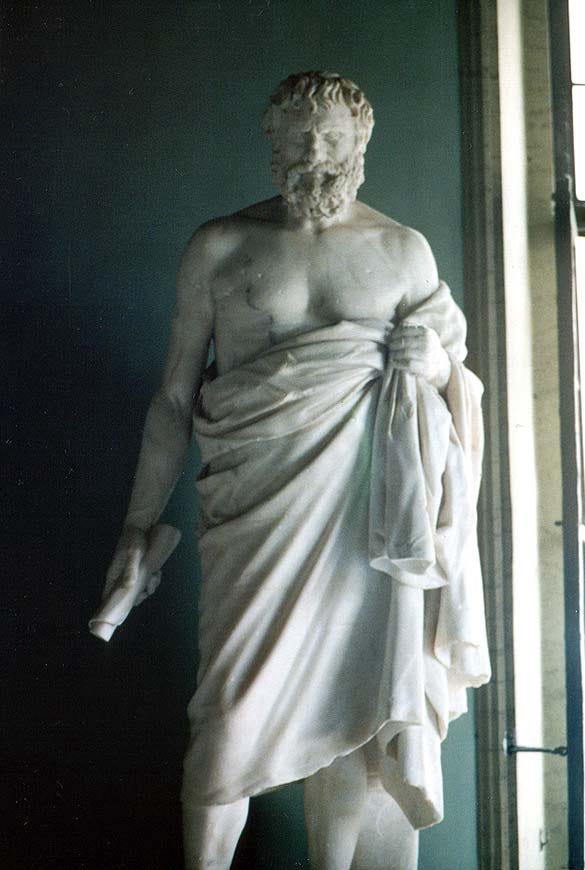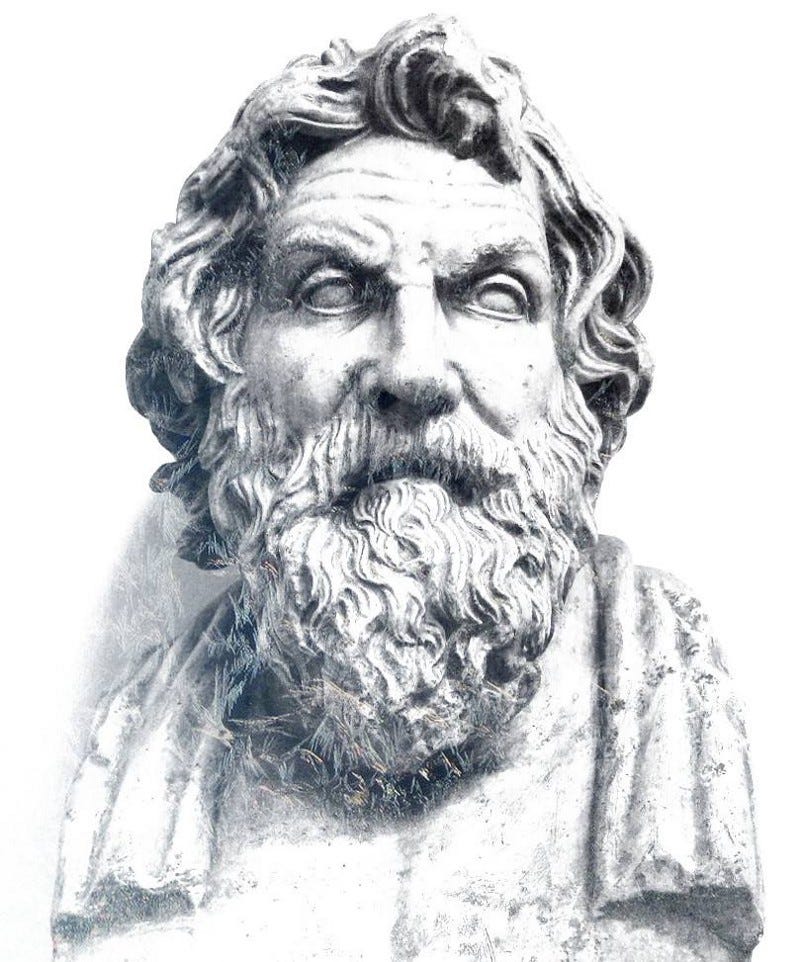How to Walk Like a Stoic
Some Thoughts on Stoicism and Walking
All truly great thoughts are conceived by walking. — Nietzsche
[Note: I wrote this article in 2019. My friend, “Scottish Thomas” (Thomas Douglas) passed away two years later in 2021.]
A few years ago, one of my friends, “Scottish” Thomas, was nearly beaten to death by four youths who tried to mug him at the Halifax Waterfront, in Nova Scotia. He told them to “Get lost!” (or words to that effect) and clung on to his knapsack, although there was nothing in it but some dirty laundry.
They crowded round him and stamped his face into the ground, fracturing his jaw in several places. Thomas had reconstructive surgery, requiring several operations. He never fully recovered his physical health. Years later, I read a news story about the attack and was shocked to see a photograph showing the blood stains left behind on the boardwalk — my friend’s blood. After he’d been discharged from hospital Tommy got into the habit of walking around town for hours more or less every day, even during the frigid winters, passing by the spot where he was attacked. He told me that he found it therapeutic: both physically and mentally. Sometimes, I’d go with him and keep him company.
We used to talk and joke, sometimes about Socrates and the Stoics, and it made me think about the role of walking in ancient Greek and Roman philosophy. (At the time, I was working on my book about Stoicism: How to Think Like a Roman Emperor.) Tommy reminded me of the Cynic, Diogenes of Sinope, albeit perhaps a softer, friendlier version. Diogenes was a “wanderer without a home” and a citizen of the whole world. He walked around Athens barefoot and naked except for a grubby woollen cloak and a small knapsack containing some basic food: some cheap bread, and a few lupin beans.
Diogenes taught that genuine freedom comes from within — from self-sufficiency rather than from wealth, power, or reputation.
Diogenes taught that genuine freedom comes from within — from self-sufficiency rather than from wealth, power, or reputation. Not from having as much as possible, in other words, but from needing as little as possible. The most famous story about Diogenes the Cynic was that when Alexander the Great, paid him a visit and asked if he could do anything for him, Diogenes replied: “Yes, step aside, you’re blocking the sunlight.” (Alexander was sometimes portrayed as the child of the solar god, Apollo.) As he was walking away, with his retinue chattering in puzzlement, the Macedonian king reputedly said: “Truly, if I were not Alexander, I would wish to be Diogenes.”
Before emigrating to Canada, I was a cognitive-behavioural therapist in London, UK. I had published several books about my special interest: Stoic philosophy and modern psychotherapy. Diogenes is traditionally seen as part of a philosophical lineage spanning over half a millennium. It begins with Socrates, extends through his follower Antisthenes, via Diogenes and the Cynics, down to Zeno of Citium, the founder of Stoic philosophy, and his many followers. I became interested in the Stoics because their writings constituted the original philosophical inspiration for modern cognitive-behavioural therapy. It struck me one day that a curious philosophical interest in the activity of walking permeates this Cynic-Stoic wing of the Socratic tradition.
Socrates himself was known for walking barefoot. His student Antisthenes, who inspired the Cynics and Stoics, likewise walked barefoot for miles to listen to him talk each day. It’s said they were both good friends with a shoemaker called Simon. (They discussed philosophy with Simon but weren’t giving him much business!) Among Socrates’ many followers, Antisthenes particularly espoused philosophy as a way of life, by embracing poverty and simplicity, and cultivating self-discipline and endurance. Socrates and Antisthenes were pioneers, in a sense, of the distinctive Cynic lifestyle made famous a generation later by Diogenes, who sought to return to nature through plain living, despite being in an urban setting.
Diogenes used to say that both mental and physical training are required to become a true philosopher. Constant physical exercise that is in accord with nature, leads to a fulfilled life. However, he reputedly also said that “no exercise is of any value unless it aims at the good order and fitness of the soul, as opposed to that of the body.” Later in his life, Diogenes was captured by pirates and sold into slavery. He was purchased by a wealthy man who entrusted him with the education of his sons. The Cynic taught the young men in his care to “go out dressed in nothing but a cloak, with no shoes on their feet; as they walked they had to keep silent, and not look around them in the street.”
The philosophy of Diogenes inspired various moral, spiritual, and psychological exercises that involved walking. He would walk into the theatre against the flow of people leaving, and walked around backwards in public arcades. Other Cynics walked around carrying fish, cheese, or bowls of lentil soup, down bustling streets, where they would be jostled by the crowds. This symbolised their desire to radically swim against the tide of popular opinion but it also served an important psychological function. Modern cognitive therapists treat social anxiety by prescribing “shame-attacking” exercises. Diogenes once tied a piece of string around the neck of a ceramic wine bottle and took it for a walk through the potter’s district. Today it’s a banana on a string. The idea is to do something embarrassing so often that, eventually, you completely extinguish your sense of shame.
Zeno, the founder of Stoicism, seems to have been socially nervous or shy until his mentor Crates instructed him to walk through the crowded streets carrying a bowl of lentil soup. When Zeno tried to hide the bowl under his cloak, Crates smashed it with his staff, leaving his student to walk around with lentil soup dribbling down his bare legs until he finally got over his embarrassment. It must have worked because about two decades later we’re told that Zeno was consulted by King Antigonus of Macedonia, one of the most powerful military and political leaders of the time. Although Zeno dressed like a beggar, Antigonus found himself looking to him as an equal, or even a superior, because of his wisdom, composure, and self-confidence — much as Alexander the Great had reputedly looked upon Diogenes the Cynic.
Like their Cynic predecessors, the Stoics had an interesting attitude toward walking. Zeno was renowned for lecturing on philosophy while walking briskly up and down the Stoa Poikile or “Painted Porch” where he started his school. (We’re told that prevented lazy students from slouching on the floor!) He disliked being among a crowd of people, such as at a drinking party or dinner, and preferred to spend his evenings either walking alone or with no more than two or three companions. His successor as head of the Stoic school, Cleanthes, walked around all night watering gardens to make a living. Chrysippus, the third head of the Stoic school, was a long-distance runner. He warned his students that when they’re consumed by passionate desires and emotions they resemble someone running too quickly to avoid obstacles in their path. The wise man resembles someone walking (or running) slowly enough to be able to stop or change direction whenever he chooses to do so — he’s still in control of his own actions.
Later Stoics also seem to have associated philosophy with walking calmly, in a self-possessed fashion. Cato of Utica, the great Stoic hero of the Roman Civil War, attracted attention because, unusually for a military officer, he generally avoided riding a horse and walked everywhere. Plutarch implies this was part of training himself in “shamelessness” (like a Cynic) as well as a means of developing physical endurance. Seneca, another Roman Stoic, likewise recommends walking in the fresh air as an exercise for Stoics. “We should take wandering outdoor walks,” he says, “so that the mind might be nourished and refreshed by the open air and deep breathing.”
However, Seneca also frequently says you can judge a man’s character by the way he walks. The ancient philosophers believed that walking barefoot encouraged circumspection. Epictetus says, for instance, that someone walking barefoot must obviously be careful where he treads, in case he steps on a nail or hurts his foot. He tells his students that, in the same way, they should be cautious not to harm their own character through the value-judgements they make, which Stoics believe to be the root cause of our unhealthy fears and cravings. To walk with wisdom is to walk with self-awareness, mindful of how we are using both our body and our mind, from moment to moment. It’s our ruling faculty, our faculty of judgement, that we have to watch like a hawk.
“Man, if you are anything, both walk alone and talk to yourself, and do not hide yourself in the chorus.”
Indeed, Epictetus tells his students about a highly-regarded Stoic philosopher called Euphrates of Tyre who spent years secretly living as a philosopher, patiently training himself to eat with moderation and to walk around with mindfulness and in a self-possessed manner. Epictetus asks his students: “Do you read when you are walking?” No, he says. If they want to become true philosophers, like Euphrates, they should walk alone and silently converse with themselves.
They should walk in order to contemplate the deepest questions in life, without paying too much attention to other people’s opinions or what’s written in books: “Man, if you are anything, both walk alone and talk to yourself, and do not hide yourself in the chorus.” Get into the habit of examining your own mind and the world around you while walking in deep philosophical contemplation, Epictetus says, so that you may come to know who you really are, rather than losing yourself in society, among the chatter of other people’s voices.






I didn’t know you were Canadian. This is a great story about walking and thinking, but also about Thomas. I found it interesting too, that he had the same name as Tommy Douglas, our father of universal healthcare, who is always voted, The Greatest Canadian. He sounds like he was an extraordinary man, also.
To take long walks, a nice resolution for this post-vacation period.